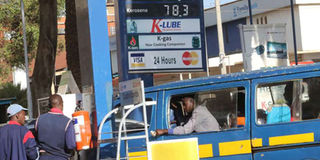Senators ask Treasury to defer adoption of fuel tax

A matatu refuels at a Nyeri petrol station on February 15, 2018. A Senate committee has said that increased fuel prices drive up the cost of living. PHOTO | JOSEPH KANYI | NATION MEDIA GROUP
What you need to know:
- The VAT on petroleum products was introduced in the law enacted in 2013 but given a three-year grace period.
- Treasury officials insisted the tax was necessary if the government is to raise the revenue required to keep the country going.
A parliamentary committee has started the push to have Treasury postpone implementation of a tax on petroleum products that could result in the price of fuel shooting up by at least Sh12 in September.
The Senate’s Energy Committee told a team from the National Treasury and the Energy Regulatory Commission (ERC) to consider postponing the start of the charging of Value Added Tax (VAT) on petroleum products.
“If you increase the price of diesel, everything else goes up,” Nyeri Senator Ephraim Maina, the chairman of the Energy Committee, said at a meeting at Parliament.
CONSUMERS
The VAT on petroleum products was introduced in the law enacted in 2013 but given a three-year grace period.
This was extended by two years in 2016, meaning the tax will begin to be charged in September this year.
The upshot of an increase in the price of fuel would, however, trigger a rise in the cost of goods and transport, as oil marketers pass on the new cost to consumers to shield their profit.
The argument by the Senate team is that price of goods and services aside, fuel was not only one of the most taxed commodities but the consumer has also had to pay more in the form of the increase of the Road Maintenance Levy from Sh6 to Sh18 in 2016.
REVENUE
Treasury officials led by Nelson Gaichuhie, the Chief Administrative Secretary, however insisted the tax was necessary if the government is to raise the revenue required to keep the country going.
“We want to collect taxes so we can continue to provide good services,” Mr Gaichuhie said.
He said the Sh34 billion that the Treasury calculates would be added to the national purse would be a boost towards the target to raise Sh1.7 trillion in the coming financial year.
The amount has already been factored in the Budget Policy Statement currently under consideration by MPs.
NATIONAL DEBT
Mr Gaichuhie also downplayed the notion by the senators that Treasury was acting under pressure from the International Monetary Fund (IMF) to do away with all tax exemptions as part of a wider plan to increase revenues, reduce budget deficits and ultimately slow down the pile-up of debt.
From the calculations of ERC, the price of fuel would increase by at least 12 per cent.
Going by the prices as at February, the price of a litre of super petrol would shoot up to Sh122.75 from Sh107.92, that of diesel to Sh110.07 from Sh96.96 and that of Kerosene to Sh86.71 from Sh76.75.
COST OF LIVING
The team from the Treasury could not properly explain the criteria used to extend the grace period when pressed by Narok Senator Ledama ole Kina.
“Is this really the right time to implement it or should you be talking to us to approve an extension?” Mr Ole Kina wondered.
Mary Seneta (Nominated, Jubilee) asked the Treasury to consider other ways of increasing revenue collection without affecting the lives of wananchi by driving up prices of goods and services.





